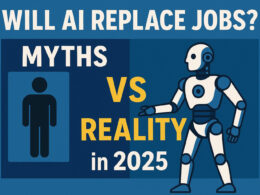Artificial Intelligence (AI) often feels like a world reserved for programming prodigies and data science gurus. But here's the truth: you don't need to be a coding wizard to build an impactful career in AI. Thanks to the rapidly evolving nature of the field, the industry now needs diverse skillsets—from strategy and business development to communication and design.
In this blog, we’ll show you how to build a career in AI even without coding. Whether you're a career switcher, a tech enthusiast, or just curious about the world of AI, this guide is for you.
Why AI Needs More Than Coders
AI isn’t just about algorithms and Python scripts. It’s an ecosystem that brings together different people to solve complex problems. Think of AI as a movie production. You have the directors (project managers), scriptwriters (data scientists), actors (AI models), and the crew behind the scenes (designers, ethicists, business analysts, and communicators).
Here are some non-coding roles in AI that are gaining importance:
- AI/ML Product Manager
- AI Ethics Consultant
- Data Analyst (using tools like Excel, Tableau)
- UX/UI Designer for AI products
- AI Policy Advisor
- Technical Writer
- AI Business Development Manager
You can thrive in AI with the right skills—even without writing a single line of code.
Start with a Solid Foundation
You don’t need to go back to college, but understanding how AI works is crucial. Here’s how to start:
Learn the Basics of AI
You don’t need to dive deep into machine learning algorithms, but get familiar with basic terminology like:
- Machine Learning vs. Deep Learning
- Supervised and Unsupervised Learning
- Natural Language Processing (NLP)
- Neural Networks
- Bias in AI
Many free and beginner-friendly resources are available online:
- “AI for Everyone” by Andrew Ng (Coursera)
- Elements of AI (Free online course)
- YouTube channels like CrashCourse and Simplilearn
Understanding these concepts will help you communicate effectively with technical teams and contribute meaningfully in cross-functional collaborations.
Explore Low-Code or No-Code Tools
There’s a growing number of platforms that allow users to build AI models without writing any code. Tools like:
- Google AutoML
- Microsoft Azure ML Studio
- IBM Watson
- Teachable Machine by Google
These platforms can help you prototype AI solutions using drag-and-drop interfaces.
Identify the Right Role for You
Once you’re familiar with the basics, the next step is to narrow down your career path within AI. Here are some options based on your background and interests:
If You Love Communication
Consider roles like:
- AI Technical Writer: Translate complex AI concepts into accessible content.
- AI Evangelist or Advocate: Educate and promote AI tools and innovations.
If You're Business-Oriented
Great options include:
- AI/ML Product Manager: Bridge the gap between technical teams and business stakeholders.
- AI Strategy Consultant: Help businesses adopt AI responsibly and effectively.
If You're Creative
Creativity is essential in user-centered AI product design:
- UX/UI Designer for AI Products: Design interfaces that make AI tools intuitive and user-friendly.
- Conversational Designer: Create experiences for AI chatbots and voice assistants.
If You're Passionate About Ethics and Policy
With AI affecting privacy, fairness, and transparency, roles in ethics are growing fast:
- AI Ethics Consultant or Researcher
- AI Policy Advisor or Analyst
Upskill Smartly
Invest time in learning complementary skills that align with your career goals:
- Data Literacy: Learn to interpret charts, reports, and AI dashboards.
- Project Management: Understand agile, SCRUM, and cross-functional planning.
- Domain Expertise: Specialize in a field where AI is making an impact—like healthcare, finance, or education.
Network and Get Involved
Join AI Communities
Surround yourself with AI-focused professionals and enthusiasts. Join groups like:
- Women in AI
- AI Global Community
- Meetups and webinars hosted by AI startups and universities
Follow Influencers and Thought Leaders
LinkedIn, Twitter, and Substack are great for staying updated. You can learn a lot from people who regularly post about the intersection of AI and business, ethics, or culture.
Attend Events and Conferences
Even if you’re not a developer, events like NeurIPS, AI Expo, and regional webinars offer valuable learning and networking opportunities.
Build a Portfolio
Yes, even without coding, a portfolio is a powerful tool. Here’s what you can include:
- Case studies of AI projects you’ve managed or contributed to
- Research summaries or blog articles you’ve written on AI trends
- UX or design prototypes for AI tools
- Strategy documents, business plans, or ethical review reports
Use platforms like Medium or LinkedIn to share your thoughts and expertise in the space.
The Future Is Bright for Non-Coders in AI
The AI industry is growing, and so is the demand for multidisciplinary talent. Businesses need storytellers, strategists, ethicists, and creative minds just as much as they need software engineers. By focusing on what you bring to the table and strategically upskilling, you can carve out a meaningful and lucrative career in AI—without learning to code.
Final Thoughts
You don’t need to be a programmer to be part of the AI revolution. With curiosity, the right mindset, and a willingness to learn, you can build a rewarding career in AI. The key is to find your niche, understand the technology, and keep growing alongside it.
Are you ready to start your AI journey, no code required? Begin today by picking one resource, joining a community, or exploring a new non-coding role. The future is waiting.
Ready to learn more? Subscribe to our blog for practical AI career tips and success stories from non-coders just like you!









